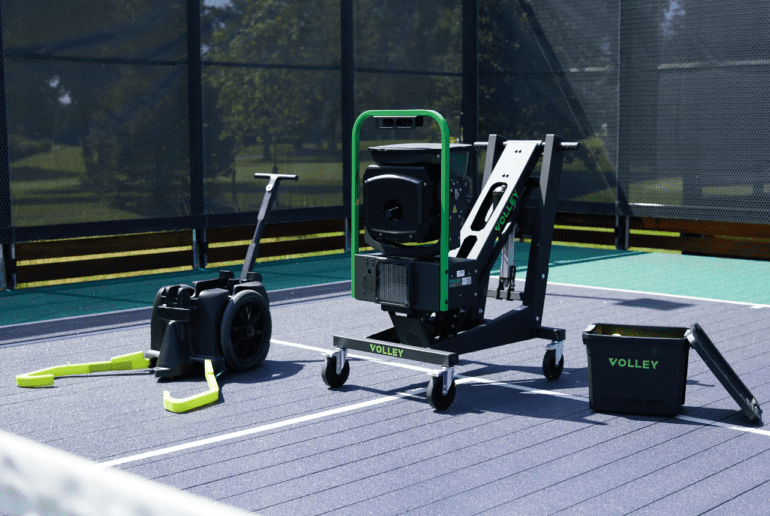- Volley introduces AI-enabled ball machine for racquet sports training.
- Unlike traditional machines, Volley’s device simulates live gameplay and adjusts to player skill levels.
- Features three cameras for tracking and maintenance, a speaker, an LED screen, and mobile app integration.
- The company experiences rapid growth, distributing trainers to clubs across the U.S.
- The leasing model charges clubs $1,500 to $3,000 per month based on features and usage.
- Founded by an engineering duo, Volley targets individual players and partnerships for expansion.
Main AI News:
A burgeoning sports technology startup, Volley, is poised to transform the training regimen of racquet sports enthusiasts, including platform tennis, padel, and pickleball players, with its innovative AI-powered sports training device. Unlike conventional tennis ball machines, which merely propel balls at varying speeds and heights, Volley’s training robot harnesses the power of AI and vision software to gather data during gameplay, analyze skill levels, and replicate live match scenarios, eliminating the need for a full team to conduct effective training sessions.
John Weinlader, Co-founder and CEO of Volley, emphasizes the versatility of their machine, stating, “Volley caters to professionals, beginners, and everyone in between, courtesy of its AI capabilities and intelligent system. It comprehends the intricacies of the game, adapts to your position on the court, and responds akin to a real opponent, ensuring a competitive experience.”
Equipped with three integrated cameras serving diverse functions such as person and ball tracking, as well as video recording, Volley offers comprehensive functionality. One of these cameras resides within the machine, facilitating maintenance tasks by enabling customer support to remotely diagnose issues and guide users through troubleshooting steps.
Another distinguishing feature is the inclusion of a speaker and LED screen, enabling instructors to lead group workouts effectively. Moreover, its adjustable height, reaching 87 inches, coupled with tilting capabilities of 56 degrees up and 38 degrees down, along with a 34-degree rotation to the left or right, ensures a wide array of shot angles for versatile training sessions.
Accessible through Volley’s mobile app, available on both iOS and Android platforms, users can access tailored drills, review footwork footage, monitor player statistics, and more. Additionally, the app allows digital control of the machine, empowering users to designate landing spots for balls via their smartphones. Furthermore, the trainer seamlessly collects and stores training data, ensuring continuity in progress tracking across training sessions.
Volley boasts over 1,007 app installations, indicating a strong uptake among users. Continuously evolving, the company recently introduced a side-by-side video comparison feature to the app, facilitating detailed analysis of form differences. Furthermore, an upcoming hand gesture feature, set to be unveiled during the RacquetX Conference later this month, will enable users to control the trainer without the need for a mobile device.
Since its release in September 2023, Volley’s trainers have experienced unprecedented demand, with stocks depleted within four months. The company successfully distributed 110 trainers to 45 platform tennis and padel clubs across the United States, spanning states such as Connecticut, Florida, Illinois, Massachusetts, Maryland, New Jersey, Ohio, and Pennsylvania.
Weinlader underscores the company’s commitment to meeting the burgeoning demand for advanced training solutions, stating, “Our exponential growth underscores the demand for our cutting-edge technology, which replicates live gameplay on the court. Similar to golf simulators enhancing golfers’ training experiences, Volley is redefining racquet sports training.”
Volley adopts a leasing model, charging clubs between $1,500 to $3,000 per month, contingent on the number of trainers required and features utilized, as well as the membership base served. The company is presently in the process of deploying its second wave of trainers, underscoring its commitment to meeting market demand.
Founded by siblings John and Dan Weinlader, both possessing engineering backgrounds, Volley stems from John’s passion for platform tennis, culminating in the inception of the idea when he improvised a tennis ball machine setup using painter sticks to replicate specific shots.
Reflecting on the journey from concept to fruition, John shares, “The limitations in traditional racquet sports training prompted me to explore innovative solutions. Three years and eight prototypes later, we have developed a trainer that meets the evolving needs of players.”
While the racquet sports sector has witnessed notable technological advancements, including portable ball launchers and AI-driven smart ball machines, Volley distinguishes itself by amalgamating video recording and ball dispensing functionalities into a singular device, thereby offering a holistic training experience.
John emphasizes Volley’s unique positioning, stating, “Volley occupies a distinct niche in the market, as conventional ball trainers no longer suffice for players and professionals alike. We envision ourselves as the next-generation solution, akin to golf simulators revolutionizing golfer training.“
“As racquet sports gain popularity, there remains a dearth of technological advancements catering to the nuanced demands of the sport, particularly in the paddle, given its unique attributes,” he adds.
Looking ahead, Volley envisions expanding its leasing model to individual players with home courts, while also forging partnerships to enhance its market presence. With a commitment to innovation and a keen focus on user experience, Volley is poised to redefine racquet sports training for enthusiasts worldwide.
Conclusion:
Volley’s innovative approach to racquet sports training represents a significant evolution in the market, addressing the limitations of traditional machines by integrating AI and comprehensive features. The company’s rapid growth and strategic initiatives, including individual player leasing and partnerships, indicate a promising trajectory for capturing a larger share of the market and reshaping the landscape of racquet sports training.

